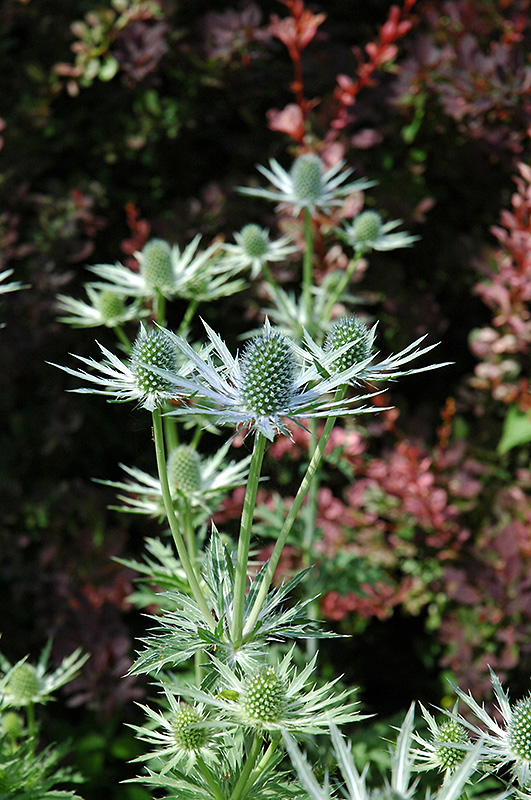The Plant Finder
Have a specific vision in mind for your outdoor space?
Search our database and find the perfect plants to meet your gardening needs.
Height: 3 feet
Spacing: 15 inches
Sunlight:
![]()
Hardiness Zone: 2b
Description:
A highly ornamental and drought tolerant selection perfect for summer beds, borders and rock gardens; featuring sturdy stems of steel blue cone-shaped flowers surrounded by silvery-white bracts and deeply toothed and cut silver-blue leaves
Ornamental Features
Miss Willmott's Ghost features bold steel blue ball-shaped flowers with silver bracts at the ends of the stems from early to mid summer. The flowers are excellent for cutting. Its attractive spiny lobed leaves emerge steel blue in spring, turning silvery blue in colour throughout the season. The navy blue stems are very colorful and add to the overall interest of the plant.
Landscape Attributes
Miss Willmott's Ghost is an herbaceous biennial with an upright spreading habit of growth. Its relatively fine texture sets it apart from other garden plants with less refined foliage.
This plant will require occasional maintenance and upkeep, and is best cleaned up in early spring before it resumes active growth for the season. It is a good choice for attracting butterflies to your yard. Gardeners should be aware of the following characteristic(s) that may warrant special consideration;
- Self-Seeding
Miss Willmott's Ghost is recommended for the following landscape applications;
- Mass Planting
- Hedges/Screening
- General Garden Use
Planting & Growing
Miss Willmott's Ghost will grow to be about 3 feet tall at maturity, with a spread of 18 inches. When grown in masses or used as a bedding plant, individual plants should be spaced approximately 15 inches apart. It tends to be leggy, with a typical clearance of 1 foot from the ground, and should be underplanted with lower-growing perennials. It grows at a fast rate, and tends to be biennial, meaning that it puts on vegetative growth the first year, flowers the second, and then dies. However, this species tends to self-seed and will thereby endure for years in the garden if allowed.
This plant should only be grown in full sunlight. It prefers dry to average moisture levels with very well-drained soil, and will often die in standing water. It is considered to be drought-tolerant, and thus makes an ideal choice for a low-water garden or xeriscape application. It is particular about its soil conditions, with a strong preference for poor, alkaline soils, and is able to handle environmental salt. It is highly tolerant of urban pollution and will even thrive in inner city environments. This species is not originally from North America.

